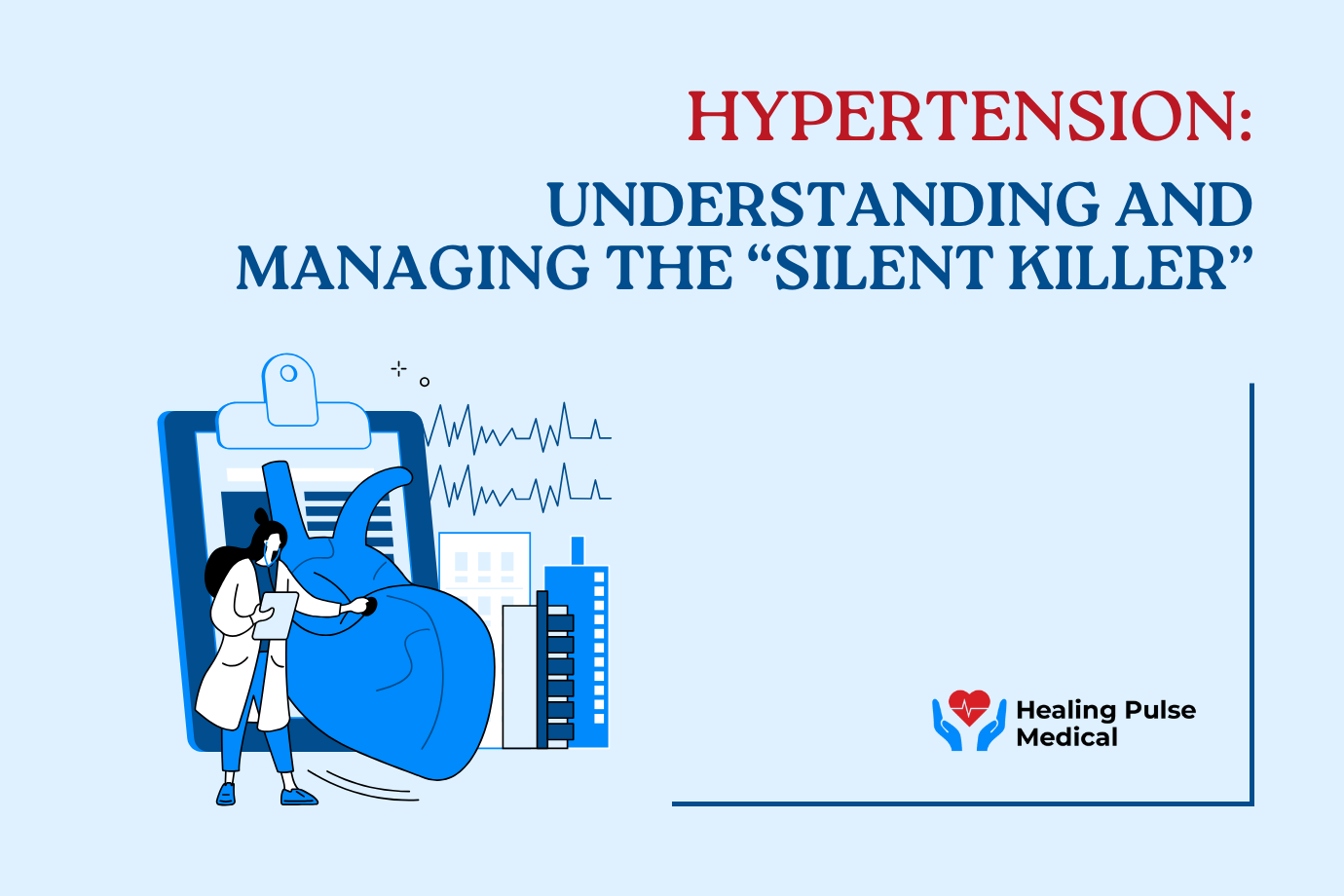
Hypertension, commonly referred to as high blood pressure, is a pressing health concern in the United States, affecting nearly half of all adults. Known as the “silent killer,” it often shows no symptoms while silently increasing the risk of serious complications like heart attack, stroke, and kidney disease. According to the Centers for Disease Control and Prevention (CDC), only about one in four adults with hypertension have their condition under control, making awareness, early detection, and management critical.
Causes and Risk Factors of Hypertension
Hypertension develops when the force of blood against the walls of your arteries is consistently too high, causing strain on your heart and blood vessels. This condition can arise due to various factors, including:
Common Causes
- Lifestyle Choices: Poor diet, particularly one high in sodium and low in potassium, is a significant contributor. Other factors include excessive alcohol consumption and chronic stress.
- Underlying Conditions: Health conditions like kidney disease, hormonal disorders, and sleep apnea can also lead to secondary hypertension.
Risk Factors
- Age: Blood vessels lose elasticity with age, increasing the likelihood of high blood pressure.
- Genetics: A family history of hypertension significantly raises your risk.
- Diet: High salt intake and diets lacking in essential nutrients can contribute to elevated blood pressure.
- Physical Inactivity: A sedentary lifestyle leads to poor cardiovascular health.
- Obesity: Excess weight increases the workload on the heart and blood vessels.
- Smoking and Alcohol Use: Both can damage blood vessels and increase blood pressure.
Symptoms and Diagnosis
One of the most concerning aspects of hypertension is its often-asymptomatic nature. While some people may experience headaches, shortness of breath, or nosebleeds, these symptoms are not specific and typically occur only when blood pressure reaches dangerously high levels.
Diagnosing Hypertension
The diagnosis of hypertension is straightforward but requires attention to accuracy:
- Blood Pressure Measurements: Blood pressure is measured in millimeters of mercury (mm Hg) and consists of two numbers: systolic pressure (the force during a heartbeat) and diastolic pressure (the force between beats). A reading consistently at or above 130/80 mm Hg indicates hypertension.
- Ambulatory Monitoring: For precise assessment, 24-hour blood pressure monitoring may be used to confirm readings outside a clinical setting.
- Physical Exams and Tests: Doctors may conduct additional tests, such as blood and urine tests or imaging, to identify any underlying causes.
Treatment and Management of Hypertension
Managing hypertension effectively requires a combination of lifestyle changes, regular monitoring, and medication.
Lifestyle Modifications
- Dietary Changes: Adopting the DASH Diet (Dietary Approaches to Stop Hypertension), which emphasizes fruits, vegetables, whole grains, and lean proteins, has been shown to significantly reduce blood pressure.
- Physical Activity: Aim for at least 150 minutes of moderate aerobic exercise weekly, such as brisk walking, swimming, or cycling.
- Weight Management: Losing even a small percentage of body weight can help lower blood pressure.
- Stress Management: Practices like yoga and meditation can help reduce stress, which contributes to hypertension.
Medical Treatment
- Medications: Common options include diuretics, ACE inhibitors, beta-blockers, and calcium channel blockers, prescribed based on your individual health profile.
- Regular Monitoring: Home blood pressure monitors can be a valuable tool for tracking progress and ensuring treatment efficacy.
Prevention Tips for Hypertension
Prevention is always better than cure. Small, consistent lifestyle changes can greatly reduce your risk of developing hypertension:
- Adopt a Heart-Healthy Diet: Prioritize fresh fruits and vegetables, lean proteins, and whole grains. Limit processed foods high in salt and sugar.
- Stay Active: Engage in regular physical activity to keep your heart and blood vessels strong.
- Reduce Sodium Intake: The American Heart Association recommends consuming no more than 2,300 mg of sodium daily, with an ideal target of 1,500 mg.
- Limit Alcohol and Avoid Smoking: Moderation in alcohol consumption and quitting smoking are critical for maintaining cardiovascular health.
- Manage Stress: Take time for relaxation and hobbies, and consider seeking professional help if stress becomes overwhelming.
- Routine Check-Ups: Regular visits to your primary care provider can help catch hypertension early, even before symptoms appear.
Conclusion
Hypertension is a common but manageable condition. Left untreated, it can lead to severe health complications, but with proper lifestyle adjustments and medical care, it’s possible to keep blood pressure within a healthy range. If you suspect you have hypertension or are at risk, consult with your primary care provider. They can offer tailored advice and treatment plans to protect your long-term health. Remember, the journey to a healthier heart starts with a single step—schedule your check-up today!
Your Health, Our Priority
Your health is an ongoing journey, and regular check-ups are key to staying on top of it. At Healing Pulse Medical in Shelton, CT, we focus on providing personalized care tailored to your unique needs. Whether it’s a routine physical or addressing specific concerns, we’re here to support your well-being with flexible scheduling and walk-in options.
Take control of your health today—Healing Pulse Medical is your trusted partner in comprehensive primary care. Schedule your appointment now and let us help you navigate your health journey with confidence.